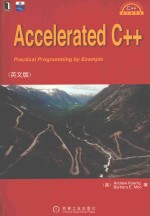图书介绍
acceleratedc英文版PDF|Epub|txt|kindle电子书版本网盘下载

- 著
- 出版社:
- ISBN:
- 出版时间:未知
- 标注页数:0页
- 文件大小:64MB
- 文件页数:355页
- 主题词:
PDF下载
下载说明
acceleratedc英文版PDF格式电子书版下载
下载的文件为RAR压缩包。需要使用解压软件进行解压得到PDF格式图书。建议使用BT下载工具Free Download Manager进行下载,简称FDM(免费,没有广告,支持多平台)。本站资源全部打包为BT种子。所以需要使用专业的BT下载软件进行下载。如BitComet qBittorrent uTorrent等BT下载工具。迅雷目前由于本站不是热门资源。不推荐使用!后期资源热门了。安装了迅雷也可以迅雷进行下载!
(文件页数 要大于 标注页数,上中下等多册电子书除外)
注意:本站所有压缩包均有解压码: 点击下载压缩包解压工具
图书目录
Chapter 0 Getting started1
0.1 Comments1
0.2 #include2
0.3 The main function2
0.4 Curly braces2
0.5 Using the standard library for output3
0.6 The return statement3
0.7 A slightly deeper look4
0.8 Details5
Chapter 1 Working with strings9
1.1 Input9
1.2 Framing a name11
1.3 Details14
Chapter 2 Looping and counting17
2.1 The problem17
2.2 Overall structure18
2.3 Writing an unknown number of rows18
2.4 Writing a row22
2.5 The complete framing program27
2.6 Counting30
2.7 Details31
Chapter 3 Working with batches of data35
3.1 Computing student grades35
3.2 Using medians instead of averages41
3.3 Details48
Chapter 4 Organizing programs and data51
4.1 Organizing computations51
4.2 Organizing data61
4.3 Putting it all together65
4.4 Partitioning the grading program68
4.5 The revised grading program70
4.6 Details71
Chapter 5 Using sequential containers and analyzing strings75
5.1 Separating students into categories75
5.2 Iterators79
5.3 Using iterators instead of indices82
5.4 Rethinking our data structure for better performance84
5.5 The 1 i s t type85
5.6 Taking strings apart87
5.7 Testing our split function90
5.8 Putting strings together91
5.9 Details96
Chapter 6 Using library algorithms101
6.1 Analyzing strings101
6.2 Comparing grading schemes110
6.3 Classifying students, revisited116
6.4 Algorithms, containers, and iterators120
6.5 Details121
Chapter 7 Using associative containers123
7.1 Containers that support efficient look-up123
7.2 Counting words124
7.3 Generating a cross-reference table126
7.4 Generating sentences129
7.5 A note on performance136
7.6 Details137
Chapter 8 Writing generic functions139
8.1 What is a generic function?139
8.2 Data-structure independence143
8.3 Input and output iterators150
8.4 Using iterators for flexibility152
8.5 Details153
Chapter 9 Defining new types155
9.1 Student_info revisited155
9.2 Class types156
9.3 Protection160
9.4 The Student_info class163
9.5 Constructors164
9.6 Using the Student_info class166
9.7 Details167
Chapter 10 Managing memory and low-level data structures169
10.1 Pointers and arrays169
10.2 String literals revisited176
10.3 Initializing arrays of character pointers177
10.4 Arguments to main179
10.5 Reading and writing files180
10.6 Three kinds of memory management182
10.7 Details185
Chapter 11 Defining abstract data types187
11.1 The vec class187
11.2 Implementing the vec class188
11.3 Copy control195
11.4 Dynamic Vecs202
11.5 Flexible memory management203
11.6 Details209
Chapter 12 Making class objects act like values211
12.1 A simple string class212
12.2 Automatic conversions213
12.3 Str operations214
12.4 Some conversions are hazardous221
12.5 Conversion operators222
12.6 Conversions and memory management223
12.7 Details225
Chapter 13 Using inheritance and dynamic binding227
13.1 Inheritance227
13.2 Polymorphism and virtual functions232
13.3 Using inheritance to solve our problem237
13.4 A simple handle class243
13.5 Using the handle class247
13.6 Subtleties248
13.7 Details250
Chapter 14 Managing memory (almost) automatically253
14.1 Handles that copy their objects254
14.2 Reference-counted handles260
14.3 Handles that let you decide when to share data263
14.4 An improvement on controllable handles264
14.5 Details268
Chapter 15 Revisiting character pictures269
15.1 Design269
15.2 Implementation278
15.3 Details288
Chapter 16 Where do we go from here?291
16.1 Use the abstractions you have291
16.2 Learn more293
Appendix A Language details295
A.1 Declarations295
A.2 Types299
A.3 Expressions305
A.4 Statements308
Appendix B Library summary311
B.1 Input-output311
B.2 Containers and iterators314
B.3 Algorithms322
Index325